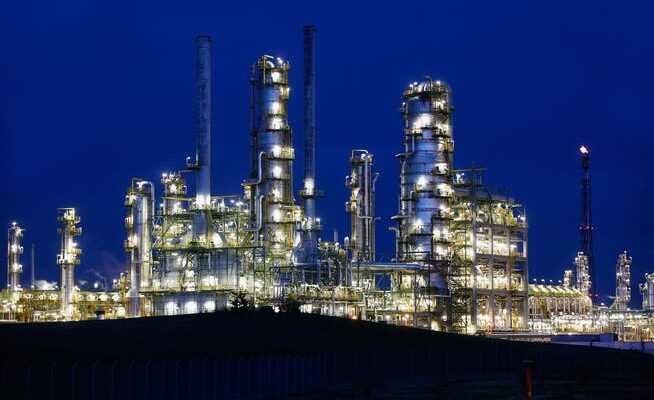The EU Commission is proposing a comprehensive oil embargo against Russia for the first time: Deliveries to the EU are to be phased out by the end of the year. However, there should be exceptions for Hungary and other countries. It cannot be ruled out that the shot will backfire.
According to the Commission’s plans, Russian oil deliveries to the EU are to be largely stopped by 2023. Crude oil from Russia is currently still being processed at the PCK refinery in Schwedt in eastern Germany.
EU Commission President Ursula von der Leyen presented the sixth package of sanctions against Russia on Wednesday. In it, the Commission proposes to the Member States to stop all Russian crude oil imports within six months and to only import refined products such as petrol, diesel or kerosene into the European Union until the end of the year.
“We are now proposing an embargo on Russian oil. It is about a complete ban on imports of all Russian oil.” said von der Leyen before the members of the European Parliament in Strasbourg. “We just have to do this, even if it’s difficult,” she added. The sentence reflects that the EU has never had such a hard time with economic sanctions against Russia.
Exceptions for Hungary and Slovakia
The 27 member states have yet to agree to the Commission’s proposal, unanimously. However, Hungary and Slovakia in particular have strong reservations. Both countries received between 75 and 100 percent of their oil imports from Russia last year. Exceptions could therefore apply to them.
According to EU sources, the two countries could continue to buy Russian oil under existing contracts until the end of 2023. At the same time, the Czech Republic and Bulgaria are said to have requested exceptions, which are also justified with the high level of dependency.
For fear of price jumps and delivery bottlenecks, not least Germany and Austria had resisted an oil embargo for months. After a special meeting of EU energy ministers However, the German Economics Minister Robert Habeck made it clear on Mondaythat Berlin is prepared for an import ban.
Thanks to new supply contracts, Habeck told journalists, demand for oil from Russia had fallen from 35 percent to the current 12 percent within a few weeks. You will not slip into an oil crisis because of this, but the embargo will not go past Germany “without a trace”. The Austrian Energy Minister Leonore Gewessler made a similar statement on Monday. Austria had already stopped processing Russian oil in March.
War chest remains full
Oil is Russia’s most important export commodity. The EU is therefore under strong public pressure to end or at least reduce its high dependency. Since the beginning of the Ukraine war, the Payments by Member States for Russian oil to over 20 billion eurosaccording to a calculation by the research organization Center for Research on Energy and Clean Air.
The concern in Brussels is that the sanctions to date will ultimately fizzle out as long as the Kremlin’s war chest remains full. Because the punitive measures are actually intended to weaken Russia’s economy and thus drive up the costs of the war.
With the transitional periods for oil imports, the Commission is now attempting to bridge the gap. One wants to “maximize” the pressure on Russia, said von der Leyen, and “at the same time keep the collateral damage for us and our partners worldwide as low as possible”. The head of the commission alluded to the fear of a price shock, which can also be felt in Washington.
In fact, there is a risk that Russia could make as much or even more money with fewer exports thanks to soaring oil prices. In Brussels, the German Economics Minister pointed out the danger that Putin could then sell Russian oil cheaper to poorer countries on condition that they support Russia politically.
Strike at Russia’s largest bank
In addition to the oil embargo sees that sixth EU sanctions package proposed the exclusion of Sberbank from the Swift international payment system. In addition, the licenses of three Russian state broadcasters will be revoked. And more individuals are ending up on the EU sanctions list, including military personnel who committed war crimes in Bucha and those responsible for the siege of the city of Mariupol. The fact that Patriarch Kirill I, the head of the Russian Orthodox Church, is also to be listed because of his propaganda work for Putin’s war course should cause a stir.
Sberbank, Russia’s largest financial institution, has so far been spared EU sanctions because it is involved in the energy deal with the West. Now people in Germany and other member states are apparently convinced that Gazprombank is sufficient for this. Unlike in the case of oil, there has so far been no sign of new sanctions for gas supplies.
It’s also interesting what’s going on with the new sanctions not is included – for example nuclear fuel elements, which France and some East Central European countries import from Russia. Ironically, the EU is no less dependent on Putin for nuclear power, which France is promoting as an alternative to fossil fuels. It will probably depend on the famous exemptions as to whether the pro-nuclear states will also support future sanctions in this area.
The Brussels correspondent Daniel Steinvorth Twitter follow.
